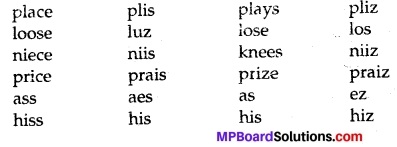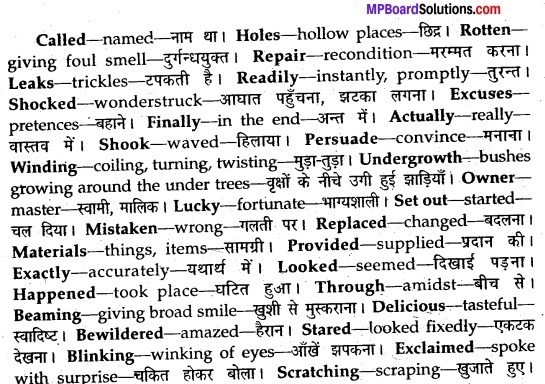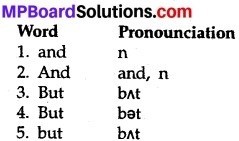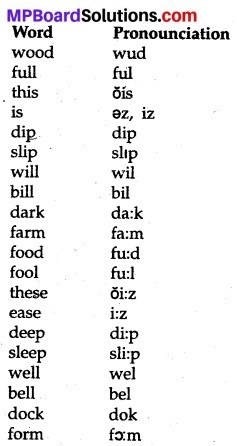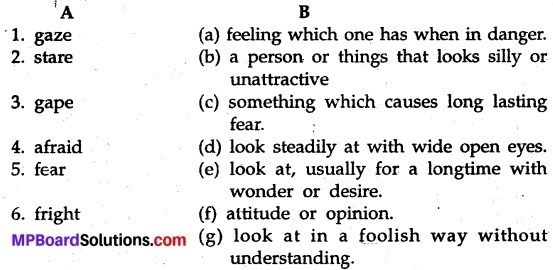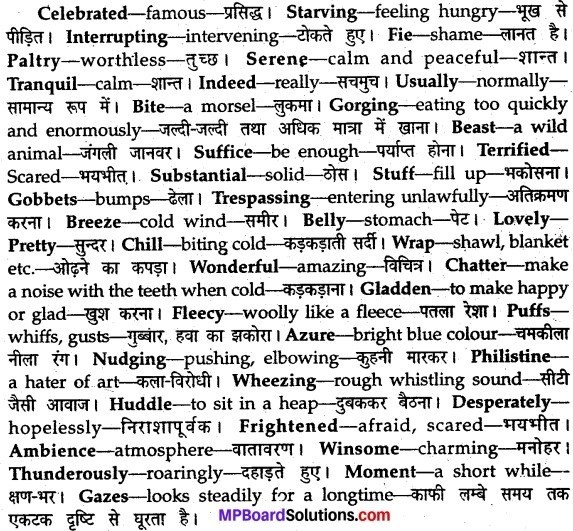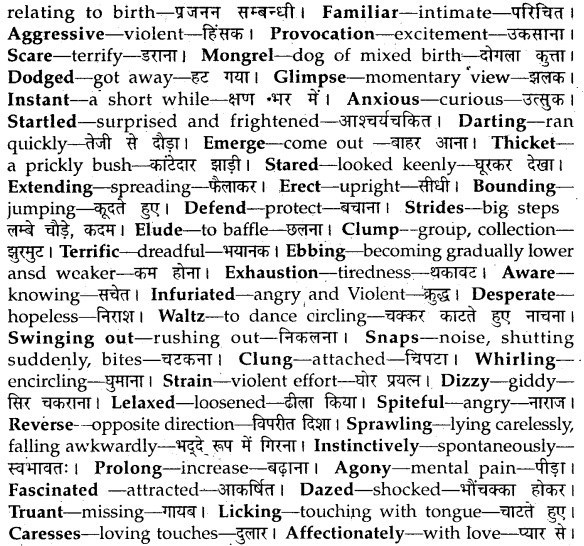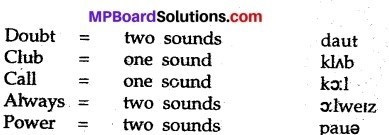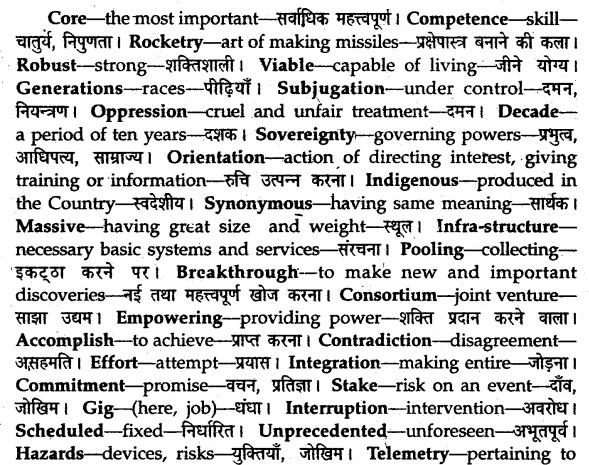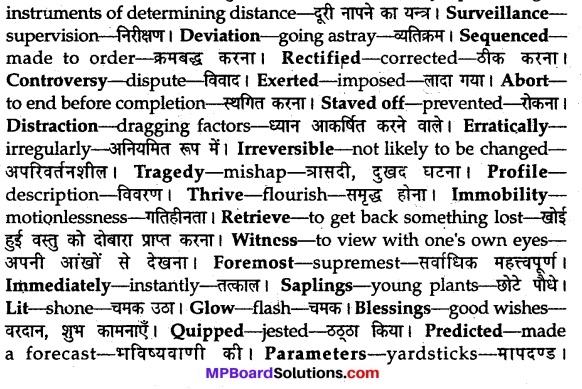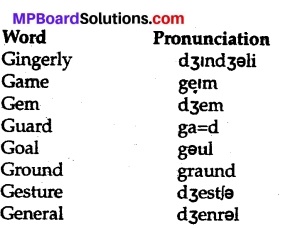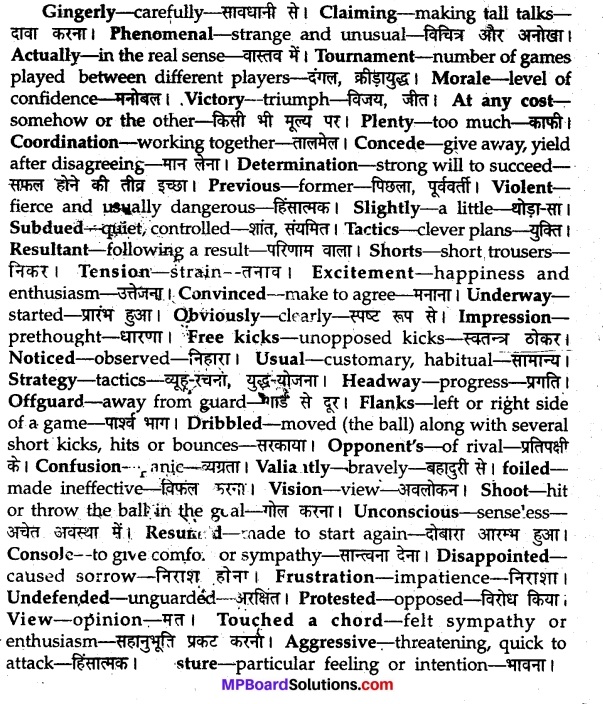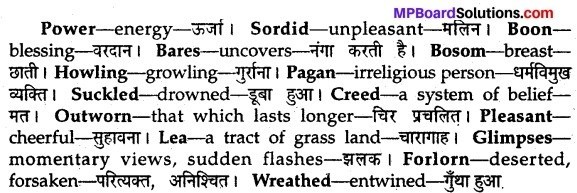MP Board Solutions for Class 9 English The Rainbow Solutions Chapter 15 How it all began Questions and Answers aids you to prepare all topics in it effectively. You need not worry about accuracy of Madhya Pradesh State Board Solutions for Class 9 English Chapter 15 How it all began as they are given adhering to the latest exam pattern and syllabus guidelines. You Can Download MP Board Class 9 English Solutions Questions and Answers, Notes, Summary, Guide pdf on is page. Enhance your subject knowledge by preparing from Chapterwise MP Board Solutions for Class 9 English and clarify your doubts on corresponding topics.
MP Board Class 9th English The Rainbow Solutions Chapter 15 How it all began
Kick start your preparation by using our online resource Madhya Pradesh State Board Solutions for Class 9 English The Rainbow Solutions Chapter 15 How it all began. You can even download MP Board Solutions for Class 9 English free of cost rough direct links available on our page. Clear your queries and understand concept behind in a simple manner. Simply tap on concept you wish to prepare chapterwise and go rough it.
How it all began Textual Exercises
How it all began Vocabulary
A. What are the different meanings of the following words, nursery, glass, cricket, watch, collector, interest, couple, record, encounter, country, bank
Answer:
Word – Meanings
Nursery : Children’s quarters; a room for children and their nurse, a plot of ground in which young plants are reared for transplantation; a fish – rearing pond; a place where animal life is developed.
Glass : A transparent, lustrous, hard and brittle substance; a drinking vessel ; a mirror ; a pair of spectales.
Cricket : A jumping and chirping insect, an open air game with ball, bats and wickets.
Watch : The act of watching; a guard, close observation, the place where a guard in kept; a small timepiece for the pocket.
Collector : One who collects revenue, the chief administrative . official of a district.
Interest : A legal concern; title; right, profit, advantage; welfare1 pecuniary stake.
Couple : A pair, a leash for two hounds; a married or engaged pair; two; a brace.
Record : A recorded Tate; register; official report of proceedings; a public document; the plate of gramophone; facts known.
Encounter: A hostile meeting; to meet with a person; an obstacle.
Country : A region; a territory of a nation; the land of one’s birth; rural districts.
Bank : A raised shelf of ground; artificial slope; ground at the edge of a river; flat topped mass of cloud; establishment for safe custody of money.
B. Use the following expressions in your own words.
large as lifer at large, by and large.
Answer:
- The old man’s poverty was as large as life.
- The robbers are still at Large.
- The people, by and large arc selfish.
C. Pronounce the following words given in pair and write their
meanings also. You can consult a dictionary.
place – palace
lake – lack
none – nun
years – ears
son – sun
people – pupil
show – shoot
poppy – puppy
fort – forte.
Answer:
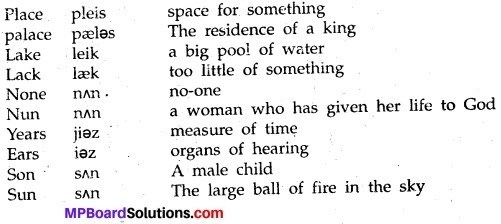
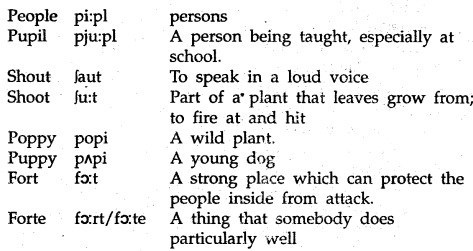
D. Pronounce the following.
Wints, Oxford, The observer, Pen. Allegra, Rhododendron, Leggie, Fontainebleau, Salim All, V”titer, Tughiaquabad.
Answer:

Comprehension
A. Answer each of the following questions in about 25 words.
1. What did the author do at the cricket ground?
2. Why was the homeward journey longer?
3. How did the author increase his information about birds and trees?
4. Where did the author learn the names of English wild flowers from?
5. How did tire author spend his weekends with the little child?
6. How was the author motivated to know more about trees and birds?
Answer:
1. The author used to go to the University Cricket ground. Allegra, his friend’s three-years old daughter used to accompany him. There he would watch the cricket game for a while. He used to buy ice-cream for the little girl.
2. Allegra was a fond collector of wild flowers. The author had to pick whatever flower she wanted. He used to pick up snow-drops, bluebells, periwinkles, lilies and many others. It took him much time to collect a handful of flowers. Therefore, the homeward journey was longer. It took them a longer time.
3. The author was unable to identify many birds and trees. He had little knowledge of the fauna and the flora. He was least interested in nature. He felt the lack of such information when he returned from abroad. He desired to increase his information. Therefore, he read books on trees, birds and insects minutely. He also accompanied , bird-watchers and horticulturists. Gradually, his fund of information increased.
4. The author was least interested in nature. He did not grow many flowers in his plot. His wife is in favour of growing vegetables. The author went abroad. There he used to go out for a walk with a three-year old girl. She asked him to pick up snow-drops and
bluebells. There were also periwinkles, lilies and many others. The author learnt the names of many English wild flowers from little Allegra.
5. The Wint family remained at home on weekends. The author spent most of the day sunning in their garden. He enjoyed hearing die chorus of thrushes and blackbirds from dawn to dusk. Lots of birds rested in their cherry and apple trees. He also played with
the little child.
6. The author was least interested in nature. He had little knowledge about the fauna and the flora so far as he remained in India. Oh his return from abroad, he left it. He was unable to identify more than a couple of dozen birds or trees. He felt that it was rewarding to know about them. His conscience motivated him to know more about trees and birds.
B. Answer each of the following questions in about 50 words.
1. What were the qualities of Allegra or Leggie?
2. Describe the private back garden of the author.
3. Justify the author’s visit to countryside on Sundays.
Answer:
1. Allegra (Leggi) was a three-year-old girl. She was the daughter of Mr. Guy Wint in Oxford. She was friendly to the author. She gave him company She was fond of eating sandwiches and drinking milk. She was also fond of going on Walk with the author.
She watched the cricket game. She was fond of eating ice-cream. She was a keen collector of wild flowers. She used to urge the author to pick up the flowers of her choice. She used to climb the author’s shoulders and rest her chin on his head. She enjoyed the game of sticking flowers in the author’s turban and beard. She was of ever demanding type. She was a great chatterbox also.
2. The author had a private back garden. It was a small rectangular plot of green. It was enclosed on two adjacent ’sides by a barbed wire fence. The hedge was covered by creepers. His own apartment and his neighbour apartment formed its two sides. There in a fencing wall of hibiseus. There are four avocado trees and a tall eucalyptus in it. There is also a small patch of grass. They have grown more vegetables and less flowers in it. Many birds and stray cats share his bird – bath. The garden faces a squarish lawn. It is shared by other residents of the colony.
3. The author used to spend Sunday mornings in winter in the countryside. He carried a pair of binoculars and books on Indian birds. He used to visit the banks of the Jamuna behind Tilpat village. He also visited Surajkund. It is a dam which supplies water to its pool. The ruins of Tughlaqabad Fort were also his favourite haunts. He saw the troops of rhesus monkeys there His visit to countryside on Sundays is justified. It renews his acquaintance with birds and wild plants grown in Delhi.
How it all began Grammar
A. Study the following sentences.
- Their son, Ben, was at a boarding school.
- In the mornings I worked in my room.
- His wife had converted to Buddhism..
- I gave her a glass of molk.
- The other two sides are formed by my neighbour’s and my own apartments.
The underlined words are prepositions. A preposition is a word that relates nouns, pronouns and noun clauses (small sentences inside a bigger one, working as nouns) in space, time, order and direction.
Now, pick out prepositions from the following sentences.
1. I spend Sunday mornings in my garden.
2. Surajkund supplies water to its pools.
3. There was a variety of wild plants.
4. I couldn’t identify more than a couple of dozen birds.
5. For the last many years I have maintained a record of the natural phenomena.
6. He always writes letters to his friends in ink.
7. What’s time by your watch ?
Answer:
1 (in), 2 (to), 3 (of), 4 (of), 5 (For, of), 6 (to, in), 7 (by).
Speaking Activity
A. Present an oral report of the natural phenomena around you. You can base your report on the details given in the lesson.
Answer:
New Delhi 28th July, 2007
I live in a village. It is located in the lap of nature. It is surrounded by woods and green fields. Cattle graze in the pastures. Birds perch and chirp on the trees. The snakes come out of their holes in the dark or when the holes are flooded with water. There ; are pools along the sandy paths. The trees blossom and birds come out of the flower plants. Bees collect honey from various flowers. The sight of the oxen and camels dragging carts or ploughing the fields is pleasant. We can see heaven on earth on a cloudy or rainy day.
B.Below are given some natural phenomena, visualise them and express your ideas orally. sunrise, sunset, rainbow.
Answer:
Sunrise, sunset and rainbow are a vital part of natural phenomena. The people awake at sunrise, pray to God and busy themselves in their daily chores. A sunny morning is an ideal morning during winter and rainy reason. The whole nature comes to life.
The workers in the fields and factories long for sunset. They finish their assigned jobs and return home to take rest. Even the animals grazing in the fields wait for the sunset. They meet their young ones then. The rainbow provides a pleasant sight. It is an arch of different colours that is formed in the sky when the sun shines through rain. Poets have praised these natural phenomena to the sky.
Writing Activity
A. Prepare a short introductory radio talk on ‘bird watching (50 words)
Answer:
Bird-watching is a pleasant activity. We see many birds in our day-today life. I am fond of seeing birds. I have seen many kinds of birds. They are of all kinds and colours. The ostrich is as large as a camel. I see a large number of bright red little robins singing in the garden every day. Black, white and red, big and small monkeys frighten the children. The dancing peacocks attract the passers-bys’ attention. The thrushes, black birds, sparrows, weaverbird, pigeons, parrots, eagles, wood peckers, cuckoos and nightingales enrich the atmosphere with their presence. Owls and crows are considered as ominous birds.
B. Make entries in your diary of the flora and fauna of your area.
Answer:
Gurgaon 24th August, 2007
I live in the rural area of Haryana. My house is located a few kilometres away from Sultanpur Jheel. I visit the lake almost every week to renew my acquaintance with the flora and fauna of our area.
Our area abounds in flora (or regional plants, flowers or trees) Apples, apricots, balsom, banana, black berry, bokhara plum, cobra flower, coconut, crab apple, daisy, date, fig, grapes, guava, Japanese plum, jasmine, lemon, lichi, lime, magnolia, malta, mango, marigold, mosamibi, mulberry, orange, papaya, pears, pineapple, plum, rose, sapodilla, sour cherry, sweet cherry, tamarind, are found here or there.
We can include apes, asses, buffaloes, bears, hounds, boars, bullocks, cats, chimpanzees, deer, elephants, foxes, giraffes, horses, hyenas, jackals, kangaroos, lambs, leopards, lions, mares, colts, mongooses, muskdeer, panthers, pigs, porcupines, rabbits, rams, rhinos, sheep, tiger, wolf and zebras in the list of fauna of our area.
Think it over
A. Just ponder over the inter-relations and interdependence among man, animals and plants.
Answer:
On the basis of our personal experience we can say with certainly that there is inter-relation and inter-dependence among man, animals and plants. Man drinks the milk of certain animals. He use the animals for his service in carrying loads or plugging his fields. He eats the flesh and sells the hides and turks of animals. He takes honey, medicines and oils from many plants. He uses the dung of animals for manure. Animals are reared by men. They feed on certain plants. Plants also depend on men for their proper upkeep. They would die if they are not properly taken care of. They also need the manure, given by the animals. Man benefits the most by selling animals and plants.
Things to do
Prepare a list of flowering plants and birds found in your surroundings also note down their distinctive features.
| Name of flowering Plants | Distinctive features | Name of birds | Distinctive features |
| Morning glory | Bell shaped violet flower | Parrot | red beak, green feathers |
| Marigold | golden yellow flowered plant | Starling | Small bird noted for chatter |
| Petunia | Funnel shaped white, violet, purple flower. | Peacock | Splendid plumages and fanlike tail. |
How it all began Additional Questions
Short Answer Type Questions (In about 25 words)
Question 1.
Where and with whom did the author spend a summer as a young man?
Answer:
As a youngman the author spent a summer with his friends, the Wints, in Oxford. Guy Wint was an official on the staff of the observer. His wife’s name was Freda. Their son was Ben and their daughter was Allegra (Leggie).
Question 2
Why did the author give company to Allegra for a walk everyday.
Answer:
The author’s friends, Guy Wint was on the staff of the observer. He remained in London most of the day. His wife Freda spent her day outside in meeting her fellow Buddhists. Their son was in boarding school. The author used to be alone at home when Allegra returned from the nursery school. He gave her a sandwich and a glass of milk. Nobody else was there at home. Therefore, the author gave her company for a walk everyday.
Question 3
How did the author reach the University Cricket grounds?
Answer:
The author was new in Oxford. He had no knowledge about the shortcuts there. Allegra knew the neighbourhood well. She led the author’s way. The paths ran through woods of oak, beech and rhododendron. Finally they reached the University Cricket grounds.
Question 4
What happened when Leggie (Allegra) felt tired on the return journey?
Answer:
On the return journey Leggie (Allegra) felt tired. The author made her climb up on his shoulders. She dangled her legs round her neck and rested her chin on his head. She stuck flowers in the author’s turban and beard. She enjoyed her game until they got home.
Long-Answer Type Question
Question 1.
Write a paragraph on ‘Grow More Trees.’
Answer:
Trees and forests precede man. They are the greatest purifiers in the world. They are the sanctuaries not only of animals and birds but also of many tribals and forest people. They give us fruit and herbs, wood and timber. They are the green lungs of the world. The poets call the trees as green gold. They maintain the ecological balance in the world. Trees give out oxygen and absorb carbon dioxide in the air. They provide shade and shelter to animals, birds and human beings in the scorching heat of summer. They bring rain and hold the soil tightly. Above all, they keep the land safe from soil erosion, floods and droughts.
How it all began Summary in English
The narrator Khushwant Singh was a youngman. He had his friend the Wints in Oxford. Guy Wint was working with the observer. He stayed in London most of the day. His wife, Freda had converted to Buddhism. Their son, Ben was at a boarding school.
The narrator’s companion was Allegra (Leggie). She was Wint’s three-years old daughter. The narrator worked in his room in the mornings. He, then walked with Allegra to University Cricket Grounds. He watched the game for a while and followed her back homewards. Allegra was an avid collector of wild Flowers.
The narrator had to pick the flowers of her choice in plenty. Then he , seated her on his shoulders. She stuck flowers in his turban and . beard. The narrator learnt the names of many English wild flowers from her. On weekends, the narrator spent most of the day sunning in the garden with Wint’s family. Their cherry and apple trees invited lots of birds. They sang through the day. Freda told him the difference between thrushes and blackbirds. The thrush sang each song twice. The songs of a variety of birds became familiar to the narrator. He also heard nightingales.
The narrator had no interest in nature before he went abroad. He foiled to identify many birds and trees. On returning to Delhi, he bought books, accompanied bird-watchers and horticulturists. His information about flora and fauna increased a great deal.
The narrator maintained a record of the natural phenomena he encountered in his private back-garden. It was a small rectangular plot of green enclosed by barbed wire fence and creepers. He had four avocado trees and a tail eucalyptus.
There was also a small patch of grass with some trees. He did not grow many flowers. They grew vegetables. His bird bath remains crowded with birds and stray cats. A squarish lawn was shared by other residents of Sujan Singh park. There were many large trees in it. Several nurseries in the neighbourhood attracted large number of birds. There were many wild trees and bushes Which attracted insects.
The narrator spent Sunday mornings in winter in the countryside at the banks of the Jamuna, Surajkund and the ruins of Tughlaqabad Fort. He visited those places every year to renew his familiarity with many birds and wild plants which grow all round Delhi.
How it all began Summary in Hindi
लेखक (खुशवंत सिंह) नवयुवक था। ऑक्सफोर्ड में विन्टज परिवार से उसकी मित्रता थी। गाई विन्ट, ऑब्जर्वर के साथ काम करता था। वह दिन में अधिकांश समय लन्दन में रहा करता था। उसकी पत्नी, फ्रेडा, ने बौद्ध धर्म कबूल कर लिया था। उनका बेटा बेन, एक छात्रावास स्कूल में था। अलेग्रा (लेनी), लेखक की साथिन थी। वह विन्ट की तीन वर्षीय लड़की थी। प्रातः के समय, लेखक, अपने कमरे में काम किया करता था। फिर वह अलेग्रा के साथ पैदल यूनिवर्सिटी क्रिकेट ग्राऊण्डज तक जाया करता था। थोड़ी देर तक वह खेल देखी करता था और फिर उसके पीछे-पीछे घर की तरफ चल देता था। अलेग्रा को जंगली फूल इकट्ठे करने का बड़ा चस्का था।
लेखक को ढेर सारे उसकी पसंद के फूल चुनने पड़ते थे। फिर वह उसे अपने कंधे के ऊपर बैठाता। वह उसकी पगड़ी। और दाढ़ी में फूल अटका देती। लेखक ने बहुत-सारे अंग्रेजी जंगली फूलों के नाम उसी से सीखे थे। सप्ताहान्त पर, लेखक, दिन का अधिकांश भाग विन्ट परिवार के साथ बाग में धूप सेकने में बिताता था। उनके चेरी और सेब के वृक्ष ढेर सारे पक्षियों को लुभाते थे। वे दिन भर गीत गाते रहते थे। थ्रशों और काले पक्षियों के बीच का अन्तर, फ्रेडा ने उसे समझाया। थ्रश, हर गीत को-दो बार गाता था। कवि, विभिन्न पक्षियों के गीतों से परिचित हो गया। उसने बुलबुलों को भी सुना। विदेश जाने से पहले, लेखक की प्रकृति में रुचि नहीं थी। वह बहुत से पक्षियों और वृक्षों की पहचान करने में असमर्थ था। दिल्ली लौटकर उसने पस्तकें खरीदीं तथा पक्षी निरीक्षकों और बागवानी के ज्ञाताओं की संगत की। वनस्पतियों तथा पशुवर्ग के बारे में उसका काफी ज्ञान बढ़ गया।
वह प्राकृतिक गोचर पदार्थों का रिकार्ड रखता था जिनके साथ उसके निजी पिछवाड़े वाले बाग में उसकी भेंट होती थी। यह काँटेदार तारों और बेलों से घिरा हुआ, हरियाली वाला छोटा-सा प्लाट था। उसके Avocadoकेचार वृक्ष तथा eucalyptus का एक लम्बा पेड़ था। कुछ वृक्षों वाला घास का एक छोटा-सा टुकड़ा भी था, उसने अधिक फल नहीं उगाए। वे सब्जियां उगाते थे। उसके पक्षी स्नानगृह में पक्षियों और आवारा बिल्लियों की भीड़ रहती थी। एक वर्गाकार घास के मैदान में सुजान सिंह पार्क के दूसरे निवासियों की भी साझेदारी थी। उसमें बहुत से विशाल वृक्ष थे। पड़ोस में स्थित कई नर्सरियाँ विशाल संख्या में पक्षियों को आकर्षित करती थीं। बहुत-से जंगली वृक्ष और झाड़ियाँ, कीड़े-मकोड़ों को आकर्षित करती थीं।
सर्दी के मौसम में लेखक ग्रामीण क्षेत्रों में जैसे जमुना के किनारे सूरजकुण्ड में और तुगलकाबाद किले के खण्डहरों में रविवार का प्रातःकाल बिताया करता था। बहुत से पक्षियों और समूची दिल्ली में उगने वाले जंगली पौधों के साथ अपने परिचय को ताजा करने के लिए वह उन स्थानों पर प्रत्येक वर्ष जाया करता था।
How it all began Word-Meanings
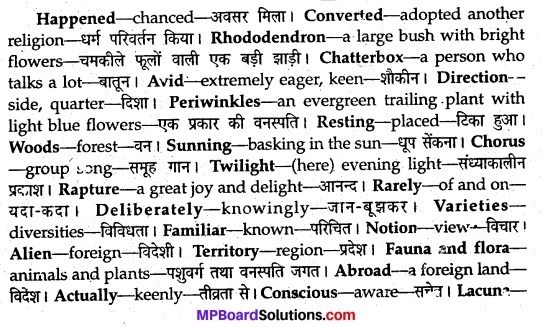
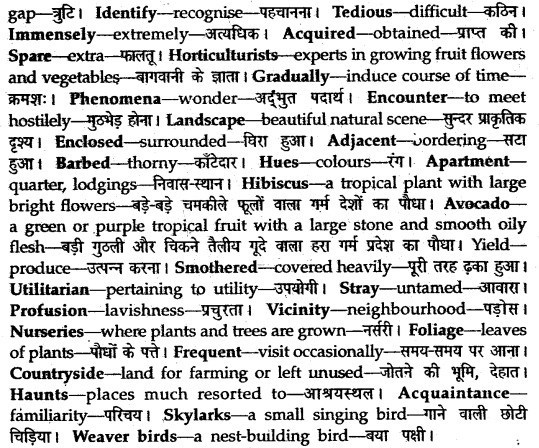
We believe the information shared regarding MP Board Solutions for Class 9 English The Rainbow Solutions Chapter 15 How it all began Questions and Answers as far as our knowledge is concerned is true and reliable. In case of any queries or suggestions do leave us your feedback and our team will guide you at soonest possibility. Bookmark our site to avail latest updates on several state board Solutions at your fingertips.
